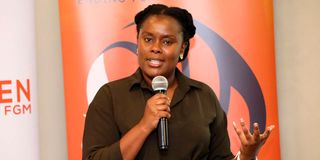Beatrice Sakaja: My narrow escape from FGM

Nairobi County First Lady Beatrice Sakaja speaks at the launch of the 'Hooyo Haigoynin' a project aimed at educating the Somali community in Eastleigh, Nairobi, on the negative impacts of FGM, at Best Western Meridian Hotel, Nairobi on February 2, 2023.
What you need to know:
- Nairobi County First Lady Beatrice Sakaja escaped FGM as a young girl.
- She says her mother went against her mother-in law and protected her.
- She underscored the need of involving men and boys in the fight against FGM.
Nairobi County First Lady Beatrice Sakaja has lifted the lid on how she escaped female genital mutilation (FGM), while she was a young girl.
Ms Sakaja revealed that she first learned about FGM when she was 17 years old, after her high school teacher gave the class homework to research on harmful traditional practices in their respective communities. When she got home, she sought assistance from her mother who told her female circumcision was practiced in her Taita community.
“My mother told me FGM was one of the harmful cultural practices in my community. She confessed that I had actually escaped the cut by a whisker, after she stood firm against my grandmother’s push to have me circumcised,” she said.
Ms Sakaja spoke during the launch of a pilot programme to address FGM among the Somali community members in Eastleigh dubbed Hoiyo Haigoynin – which loosely translates to “Mum don’t cut me”, held in a Nairobi hotel.
She regretted that most of her aunties and other relatives have been circumcised, and thanked her mother for standing firm against what she described as cruel, meaningless cultural practices.
“Women must stop cutting girls and fellow women. My mother went against her mother-in law and ended up protecting me from being cut,” she said.
She further underscored the need of involving men and boys in the fight against FGM, noting that they hold immense influence in changing culture and perception in their respective communities.

From left: Anti-FGM Board Director Dr Rashid Ali Omar, CEO Bernadette Loloju, Nairobi County CEC Maryam Dahir and Ms Sakaja at the 'Hooyo Haigoynin' project launch on February 2, 2023.
“Time is ripe for men to talk to their sons and brothers on why they must fight FGM. My mother managed to shield me from the cut because she had the support of my father and her father-in-law, which underscores the influence that men wield on such matters,” the First Lady added.
Ms Sakaja hailed the “Mum don’t cut me” project, terming it an important initiative that all must support to protect women and girls in Nairobi from the cut.
The pilot programme spearheaded by Zinduka-Kenya in conjunction with Men End FGM Foundation will be undertaken for a period of 12 months. It targets the Somali community, which has more than 90 per cent FGM prevalence.
Latest data from the Kenya Health Information System (KHIS) seen by Nation.Africa, shows that the outlawed cultural practise thrives in the city.
The data provided by Nairobi County Government indicates more than 2,000 women living in Nairobi reported to various hospitals in 2022 with FGM related complications.
Urban FGM
The figures from January to December 2022, shows a total of 2,479 pregnant women and mothers who visited hospitals for antenatal care and delivery, had complications associated with FGM.
Nairobi County Chief Officer in charge of Gender and Inclusivity Maryam Dubow Dahir, underscored the need for both the national and county governments to work together to eradicate the vice.
“The county government fully supports the project and is working to have a budget provision to fight FGM. We are committed to fight gender violence by fighting some of these harmful practices,” she said.
Head of Operations at the Men End FGM Foundation Peter Kemei, said the data on FGM cases in Nairobi is alarming.
He said urban FGM is yet to be fully addressed and called for immediate intervention.
“We are, through this project, stepping in to reign on urban FGM, which has received minimal interventions on advocacy in the past, as most organizations have channelled their efforts and resources upcountry,” Mr Kemei said.
He revealed that they had singled out Eastleigh due to the rising FGM cases in the area including medicalized FGM and “FGM tourism”.
The Kenya Demographic Health Survey (KDHS) 2022, released last month, showed that despite the reduction in the national prevalence from 21 in 2014 to 15 per cent, it was gaining traction in Nairobi. Participants at the launch said the KDHS findings is a clear indication that urban FGM needs attention if we are to achieve the desired zero FGM case by 2030 in line with the sustainable development goal (SDG) five target.





